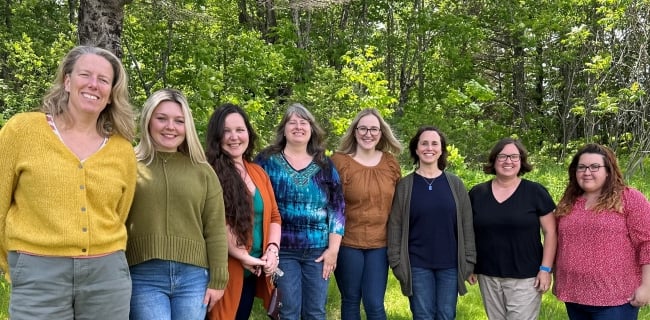You have /5 articles left.
Sign up for a free account or log in.

College and career success coordinators working at Maine community colleges gather for a summer retreat.
Maine Department of Education
Carolyn Haskell, college and career success coordinator at Kennebec Valley Community College in Maine, heard from a concerned academic adviser at the college earlier this year that a student might be underprepared for an upcoming English 101 course.
Haskell reached out to the struggling student and connected her with virtual tutoring through an adult education program. When the student decided she wasn’t ready for college-level work and needed to withdraw from the course, Haskell went with her to the adult education center nearest to her home so she could enroll in college preparatory classes. The student now plans to re-enroll in the English class in January, and Haskell and staff members at two different adult education programs are providing her with academic support.
“I think it’s much less likely that we’ll lose her completely,” Haskell said of the student.
Haskell is one of seven college and career success coordinators across the state, one on each campus of the Maine Community College System. They were hired as part of an initiative begun last summer by the Maine Department of Education and the community college system to bridge the gap between adult education centers and community colleges in the state.
Coordinators at the adult education centers offer academic and career advising to any current or prospective student in need of their services, but they specialize in helping students and graduates of adult education programs to transition to and persist in college. They also help underprepared college students take advantage of adult education resources, such as free or low-cost college preparatory and English language courses. Over the last year, coordinators have worked with 1,950 students and counting.
The coordinators are paid for through the Maine Jobs and Recovery Plan, an effort by Governor Janet Mills, and approved by the state Legislature in 2021, to invest $1 billion federal COVID-19 relief dollars to boost the local economy. The initiative is budgeted to receive $2 million over two and a half years, and state education officials are currently working on plans to keep the roles going into the future.
Lana Sawyer, state education representative at the Maine Department of Education, noted that the majority of students in adult education programs who pursue higher education go on to community colleges.
“So, adult education and the community college working together is a way that we can more holistically support learners, she said.
Southern Maine Community College introduced the first coordinator position in 2019, and the success of that role led to the larger statewide effort that began last year.
Paul Charpentier, vice president and academic dean at Southern Maine, said the state’s adult education programs are typically located at high schools, unlike some other states that base these programs on college campuses.
“We’ve always had a problem when we refer students to adult ed—the referral doesn’t work very well because they’re not here,” he said. “You can’t walk [students] over to somebody.” But now students have a direct connection to adult education programs through the coordinators, “and they provide different supports than we do.”
He said the timing of the statewide coordinator program is opportune. The state launched a temporary free community college program last year for prospective students with either a high school degree or equivalent who graduated in 2020, 2021, 2022 or 2023. These students can attend Maine community colleges for two years with all tuition and fees covered after state and federal financial aid. The program went into effect last summer and was recently extended for another two years for high school graduates in 2024 and 2025.
The adult education graduates taking advantage of free college will now have additional support through the coordinators—and so will their younger peers. Charpentier noted that free college has led to “an influx of students who aren’t all perfectly ready for college” at Southern Maine, so having extra supports available to them via adult education experts helps.
Bethany Huoppi, college and career success coordinator at Northern Maine Community College, said she’s worked with 18 students who transitioned to college from adult education programs and 11 prospective and current college students referred to adult education services so far, in addition to the other students she advises. She’s guided some college students into free adult education courses this summer, including a new adult education chemistry course, developed to fulfill a requirement for the college’s nursing program.
“It’s just nice to be able to be there and have those conversations … to be able to say, ‘Hey, where can we work together to be able to help these students be able to do what they want to do?’” Huoppi said.
Benefits of Building Bridges
More than a million adults were in state-administered adult basic education, adult secondary education and English as a second language programs in 2018, according to the National Center for Education Statistics. A report by the Urban Institute cites a 2013 U.S. Department of Education estimate that only 3 to 6 percent of adult education students transition to higher education and earn any kind of postsecondary credential.
Maine adult education programs awarded at least 1,000 high school credentials to adult learners last year alone, according to a press release from the Maine Department of Education. Yet these learners are often overlooked as a potential recruitment pool by higher ed leaders, even as colleges are struggling to recover from enrollment declines related to the pandemic, said Rachel Pleasants McDonnell, a director at Jobs for the Future, an organization focused on helping college and workforce leaders create equitable economic outcomes for students. Jobs for the Future launched an initiative in 2011 to work with a handful of states to improve their pipelines from adult education programs to community and technical colleges.
“These are students that have already made a commitment to education,” she said. “They often are very motivated students with a strong desire to learn.”
She noted that college systems and states have used various strategies to smooth the transition from adult education programs to college, including enrolling students in credit-bearing college courses while in adult education programs, allowing adult education coursework to replace remedial coursework, training college instructors to better serve these students and offering targeted financial supports. Having coordinators on college campuses, as Maine does, isn’t unheard-of, but it isn’t widespread, either, she said.
“We know through a lot of research that having a dedicated person can just make a huge difference in helping people navigate between systems,” she said.
Students in adult education programs face heightened barriers to enrolling and persisting in college. Sawyer said they have diverse needs because adult education programs are so varied. Some people attend these programs to prepare for high school equivalency exams because they dropped out of high school or graduated from high school, and sometimes college, in another country. Others are taking workforce training classes or courses to bolster their English language proficiency or study skills.
Sawyer noted that some students come to adult education programs with “not great experiences” from high school.
“Maybe that was the reason that they dropped out,” she said. “So, then continuing on with their education might be quite scary for people, and they might not feel ready for it.”
She added that many of these learners are first-generation students, or immigrants wanting to earn American degrees in professional fields they’ve already practiced in their home countries, and they need help navigating the community college system.
Adult education students are also often older than traditional-age college students and are more likely to have family or work responsibilities competing with college, Huoppi noted. She said part of her job is talking with students to figure out, “how can we make this work?” Sometimes the answer is taking classes part-time or online, or it can mean connecting students with resources, such as free laptops or scholarships. Huoppi tries to be a “one-stop shop,” whatever the need.
Sawyer emphasized that college students from any educational background can benefit from coordinators’ ties to nearby adult ed hubs. She noted that because so much of Maine is rural, some college students live far away from their campuses and might have long commutes or take courses online. For some, it’s easier to go to local adult education programs for tutoring help or other services. Coordinators can help make those connections.
“I don’t think a lot of people know that you can have that dual support,” Sawyer said. “It doesn’t have to be one or the other.”
Haskell has found the skills she acquired working with adult education students more useful serving other kinds of college students than she expected. She’s familiar with working with students with social anxiety who “suffered from experiences in traditional school that they never quite got over,” and she believes traditional-age students today whose high school years were disrupted by the pandemic and the abrupt shift to online learning are now facing some similar struggles.
“I like having my feet in both worlds,” she said.





